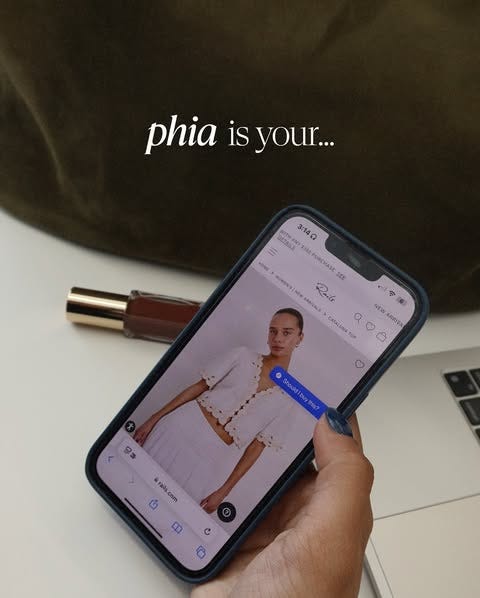I Talked to Phoebe Gates About Her Fashion-AI Startup
Is building in public dead? Extracting Phia's media-first playbook
Image via Phia Instagram
Over the past few months my timelines have been full of renewed discourse around founders building in public and whether or not this level of brand transparency should be put to rest.
It’s no secret that no one cares about daily vlogs, a silly photo of your matcha mug, or polls about what packaging you’re deciding on as much as they used to. The appetite for behind-the-scenes content has tanked, and sustaining attention now requires more output than most solo founders can realistically produce.
Still, I don’t think building in public is irrelevant, it just requires more scale as audiences expect higher production value, deeper storytelling, and more consistent output.
Since my earliest days of entrepreneurship, I fantasized about the privilege of leveraging my own likeness as a cheat code—which is why as building in public starts to feel more antiquated, a founder-as-brand approach piques my curiosity now more than ever.
This brings me to Phia.
ICYMI: Phia is a browser extension that launched last month by Stanford roommates Phoebe Gates (whom the NYTimes called “the most stylish of Bill and Melinda Gates’s children”),and Sophia Kianni (30 U 30 alum for her work in climate activism). It’s designed to make shopping secondhand smarter by offering resale value data and price alternatives that streamline the steal.
With a reported $850k in funding including a cool $250k grant from their alma mater, and high profile backers like Kris Jenner and Spanx’s Sara Blakely, something of their origin story feels very retro and girlboss (before it was a slur).
Phoebe and Sophia are executing a media-native strategy with a high-profile build that includes their weekly podcast The Burnouts (distributed via Alex Cooper’s Unwell Network), a well-orchestrated content-led approach across both brand and personal IG channels, a Substack newsletter, and early name recognition that predates the product.
We connected here on Substack (the algorithm works, y’all) and Phoebe offered to let me play with an early adaptation of the app—I found the extension pretty, refreshingly functional, and surprisingly sleek (easier to download and use than you’d think). I sadly was unable to make the NYC launch, although I’m sure I would’ve been the oldest person there (lol).
As I dug deeper into the brand system, I found myself circling a bigger question:
If I got to start from a place of visibility and cultural buy-in, what would my 23 year old self have done with it?
Here’s what the Phia girls are talking about below.
Image via Phoebe Gates Instagram
SF: Who did you build Phia for, and what do you want them to feel when they engage with it?
PG: Phia was born out of our college-era frustration with online shopping. We were spending hours we didn’t have to spend scrolling, avoiding fast fashion, and constantly coming up short or overwhelmed. Now, anyone with the Phia app or extension can save time, money, and make smarter choices in one click. We surface real-time pricing insights, flag great finds with high value retention, and source secondhand or similar alternatives when there are better deals to be had.
The user experience is empowering, and makes the entire thrill of the hunt more seamless. Whether it’s a designer splurge or an everyday staple, the customer is getting it for the best price—with confidence.
SF: How are you thinking about marketing as an emerging fashion-tech brand right now—especially in a space that’s evolving so fast?
PG: We’ve always taken the approach of “building in public,” in order to create a product that makes its users the smartest shoppers in any space. This means showing up at any touchpoint where our consumer is, learning what works, and adapting quickly to meet them again at the next turn.
SF: You’re also building on Substack, which more founders are turning to lately. What made you want to show up there—and how does it fit into how you’re thinking about storytelling and brand-building overall?
PG: Substack just clicked. It makes it easy to connect with people in a frictionless, slightly addictive way. It felt like a safe space, and quickly became a home for building our pre-launch community during beta testing. We’ve connected with so many thoughtful shoppers with honest and practical feedback, and people who share the spirit of collaboration and entrepreneurship. It’s also filled with experts and creators who are baring their truest selves. I love stumbling on a name I am not familiar with, and finding entire new worlds and extended communities. We’ll keep sharing our own experiences and fashion and tech musings, collaborators, and weekly podcasts - and experimenting as we go.
SF: Launching a platform like Phia doesn’t come cheap. How did you approach funding—and how are you thinking about speed and scale as you grow?
PG: Right now, we’re heads-down on product and user growth. But we’re also pulling back the curtain a bit on The Burnouts—sharing some of what we’re learning as we build, and bringing on experts from our network to do the same.
SF: You’re not just co-founders—you’re close. I’ve been through a founder/friend breakup early in my own entrepreneurial journey, so I know how messy that dynamic can get. How do you balance your roles inside the company—and what would you say to people who believe friendship and business don’t mix?
There’s something so magical about getting to build everyday with my best friend in a world where we see women so often pitted against each other We’re fortunate to be in a space with other women we look up to, and have the opportunity to learn from.
Having a support network outside of work, and staying focused on the job in front of you - for us, that’s Phia - is grounding. One big thing I’d recommend to any cofounder is a monthly cofounder date night, having a cofounder is like having a rock but you need to be able to make time for the friendship this ritual has been key for Sophia and I as well as a monthly reflection checkpoint to say hey what did we learn and what can we do better? That constant communication is so vital to bringing our vision to life.
SF: Congrats are in order on launching The Burnouts, your new podcast with Unwell.
Phoebe, on the show you mentioned that your parents were adamant about you staying in school before starting a business—your siblings took more traditional paths, and your dad encouraged you to take a different approach than he did with Microsoft. Sophia, you shared feeling pressured to be responsible as a first-generation Iranian immigrant. What enticed you about the path of founderhood—and what ultimately made you choose it?
PG: Really, timing. We liked collaborating, saw a specific gap in the market—and after some early ideas that weren’t a fit, we found we were uniquely positioned to solve the problem Phia addresses (and passionate about making it happen together). The time to do it is when you see it - so we hit the ground running and catapulted ourselves to NYC.
SF: Where do you see Phia going in the next few years? Are there categories or directions you're already dreaming into?
PG: Right now, we’re focused on perfecting the core product, and user growth - with the long-term vision becoming an end to end AI shopping assistant.
You can download and shop the Phia app here.












love this!! so inspiring to see!